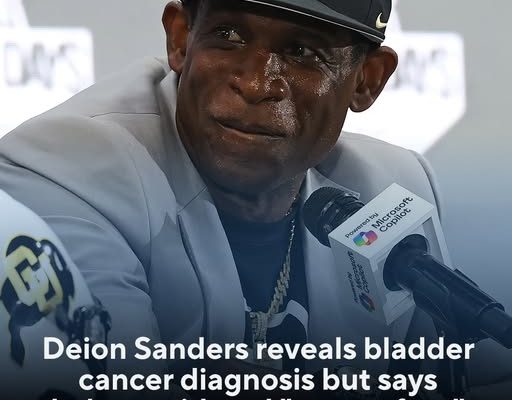The Colorado Buffaloes football program has seen an incredible transformation since the arrival of head coach Deion Sanders, a Hall of Fame defensive back and one of the most electrifying personalities in all of sports. But while Sanders’ leadership on the field has captivated fans, his recent announcement on Monday brought attention to an entirely different battle—one fought far from the sidelines. In a raw and deeply human moment, Sanders revealed that he had been diagnosed with bladder cancer, a condition that led to a major surgery involving the removal of his bladder and the creation of a new one. His doctor confirmed that following this surgery, Sanders is now cancer-free.
Sanders has always been known for his charisma, his motivational energy, and his ability to face challenges with an unflinching sense of purpose. From his days as “Prime Time” in the NFL and MLB to his current coaching gig in Boulder, his story has been one of resilience and reinvention. Still, even for someone like Sanders—who’s faced down doubters, battled through foot surgeries that nearly led to an amputation, and overhauled a struggling Colorado football program—this cancer diagnosis brought a deeply personal and life-altering confrontation with mortality. The revelation underscores a theme that runs throughout Sanders’ public and private life: perseverance.
The fact that Sanders decided to go public with his diagnosis and surgery speaks volumes about his character. For someone constantly in the limelight, it would have been easy to keep his health issues private until he had fully recovered. Instead, Sanders has chosen transparency, likely in part to inspire and educate others. His decision reflects a broader approach that he has always taken—of turning personal trials into teachable moments for his players, fans, and community.
In a video shared online, Sanders and his medical team discussed the details of the surgery. The decision to remove his bladder came after careful consideration and was seen as the best option to ensure the complete removal of the cancer. Bladder cancer, depending on the stage at which it is discovered, can be aggressive and pose a serious risk. By opting for bladder removal followed by the construction of a neobladder—a newly created internal bladder made from a segment of intestine—Sanders and his doctors aimed not only to eradicate the cancer but to preserve as much of his normal urinary function as possible.
The procedure itself is complex and life-changing. It requires immense strength during recovery, both physically and mentally. That Sanders has come through this ordeal and is now cancer-free is a testament to his toughness and commitment to his health, family, and role as a mentor and leader. His resilience is no surprise to those who have followed his journey. In recent years, Sanders has undergone multiple foot surgeries, including the amputation of two toes, which were the result of complications from blood clots. He has coached games in a wheelchair, with walking boots, and through immense physical discomfort. Yet his energy, passion, and commitment to his team have remained unwavering. His battle with bladder cancer is just the latest chapter in what has become one of the most inspiring sports narratives in modern times.
For the University of Colorado and the football program he leads, Sanders’ health update has profound implications. While he is now cancer-free, the ordeal has highlighted the delicate balance between his personal health and professional responsibilities. The players he coaches look up to him not just as a football mind but as a life coach. His honesty about his medical condition will no doubt resonate deeply with his young players, many of whom come from challenging backgrounds and are navigating their own personal adversities. Sanders’ message is clear: face life head-on, fight for what matters, and never let fear dictate your destiny.
The football world has rallied around Sanders with an outpouring of support. Fans, fellow coaches, former players, and media personalities have sent their well-wishes, praising his bravery and resilience. It’s not just about football anymore—it’s about the human being behind the whistle and the sunglasses. This is a man who has made a name for himself through flash and flair but who continues to demonstrate depth, introspection, and profound strength.
Sanders’ fight with bladder cancer also brings attention to a disease that, while not uncommon, is rarely discussed in the public eye. Bladder cancer affects thousands of people each year, and early detection is critical. By speaking out about his diagnosis and treatment, Sanders may have helped start important conversations about symptoms, diagnosis, and treatment options. His openness could very well encourage others to seek medical care early, potentially saving lives in the process. The educational value of his transparency cannot be overstated.
For many athletes and coaches, the physical toll of sports ends with retirement. But for Sanders, who continues to push his body and mind to the limit even in his coaching career, the challenges have only multiplied. He juggles responsibilities as a father, a coach, and a public figure, all while managing serious health issues. Yet at every turn, he refuses to be defined by his setbacks. His faith and his family are central to his strength, and it’s clear that he leans heavily on both as he navigates these difficult periods.
The timing of Sanders’ announcement is also notable. With the college football season fast approaching, questions naturally arise about how his recovery might impact the Buffaloes’ upcoming campaign. But knowing Sanders, he will likely be on the sidelines, shouting instructions, inspiring his team, and wearing that unmistakable Deion swagger. If anything, his recent health battle will further galvanize his players and fan base. They’re not just playing for a coach now—they’re playing for a survivor.
And Sanders is not just a survivor in the medical sense. He has survived media skepticism, program overhaul criticism, personal physical ailments, and now cancer. Through it all, he has remained unwavering in his belief in purpose, discipline, and faith. His coaching philosophy goes beyond Xs and Os. It’s about elevating young men, pushing them to believe in themselves, and holding them accountable to a higher standard. He doesn’t just want to win games; he wants to mold character. That’s why this cancer-free diagnosis means so much—not just to him, but to all who look up to him.
Even when facing health challenges, Sanders continues to work on his long-term vision for the Buffaloes. In just a short time, he has turned Colorado into a national conversation piece, recruiting top talent, reviving fan interest, and bringing in a level of media attention the program hasn’t seen in decades. His presence is transformative, and now with his health restored, there’s no telling how far he might take the program in the coming years. The players trust him because he walks the talk. He knows adversity intimately, and he teaches his team how to meet it head-on.
The importance of this moment also lies in its emotional impact. For Sanders’ family, this was a terrifying ordeal. They’ve seen him endure pain before, but cancer is a different kind of fear. That he has emerged from this with renewed strength is a blessing they do not take for granted. For his children—some of whom play for him—it’s a reminder of how fleeting and precious life can be. And for Sanders himself, the experience likely adds a new layer of appreciation for every practice, every game, and every moment on the field.
In the broader context of college athletics, Sanders’ cancer diagnosis and recovery serve as a stark reminder that the men and women who coach these teams are human beings first. The pressure to perform, recruit, and win is immense, and health often takes a back seat. Sanders’ story may encourage other coaches and administrators to prioritize their well-being, to get regular checkups, and to be honest about their medical journeys.
What Deion Sanders has accomplished in football is legendary, but what he’s accomplishing off the field may be even more significant. To lead a major college program while recovering from bladder cancer is nothing short of heroic. His example extends beyond the locker room—it stretches into households, hospitals, and communities that see in him a reflection of the everyday fight for life and purpose.
His victory over cancer doesn’t mean the end of challenges, but it’s a powerful milestone in a life filled with extraordinary moments. Sanders has shown us once again that he is not defined by circumstance, but by how he rises above it. His swagger remains intact, not as a symbol of arrogance, but as a badge of survival. Whether you’re a Colorado Buffaloes fan, a follower of his NFL days, or simply someone who appreciates stories of courage, Deion Sanders has given the world another reason to be inspired. His fight against bladder cancer is not just his own—it’s now a part of the fabric of the legacy he continues to build with every breath, every stride, and every lesson he teaches.



